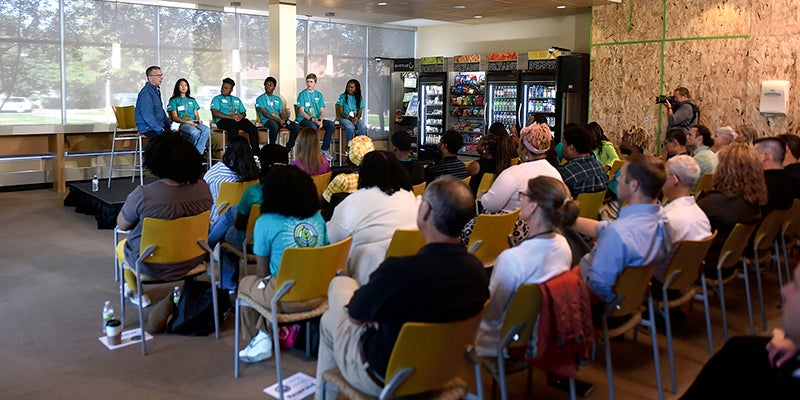Dissecting a deal: Hormel’s purchase of Skippy should benefit international sales, stockholders
Published 11:01 am Friday, January 4, 2013

Hormel Foods Corp. CEO Jeff Ettinger talks about the $700 million acquisition of Skippy peanut butter during a press conference Thursday morning. -- Eric Johnson/photodesk@austindailyherald.com
When Hormel Foods Corp. finalized its deal to acquire the Skippy peanut butter brand, it instantly added 4 to 5 percent in total annual sales. But as CEO and president Jeff Ettinger points out, that’s before his team even gets their hands on the iconic brand.
Hormel announced the deal Wednesday morning to buy Skippy for $700 million, the largest deal in company history.
 Domestically, Hormel hopes the brand’s recognition will help with marketing, and they’re already talking about innovative ways to sell the sandwich spread. But internationally, the company sees major room for growth, especially in the mega-market of China, where peanut butter and Spam are just catching on. There, Hormel hopes to get in on the ground floor.
Domestically, Hormel hopes the brand’s recognition will help with marketing, and they’re already talking about innovative ways to sell the sandwich spread. But internationally, the company sees major room for growth, especially in the mega-market of China, where peanut butter and Spam are just catching on. There, Hormel hopes to get in on the ground floor.
A growing product in a growing market
China has the world’s second largest economy, with an estimated GDP of $8.3 trillion in 2012 and $9 trillion in 2013, according to CNN. That Asian country may be one of the biggest reasons Hormel pulled the trigger on the Skippy deal, as its consumers are not only just catching on to peanut butter, but Hormel’s larger presence there should help Spam sales in the process.
Skippy is the leading peanut butter brand in China and is sold in more than 30 other countries on five continents. Total annual sales are expected to be about $370 million, with nearly $100 million of that outside the U.S., and the majority of that in China, at $30 to $40 million, followed by Canada.
“China has been a focus for more than a decade … and [the peanut butter market] is growing rapidly there,” Ettinger said. “I hope it will complement our growing Spam market.”
Hormel gets the vast majority of its sales in the U.S., with only about 4 percent of revenue coming from abroad. But the $100 million in international sales will be an immediate 30 percent boost for its international division.
“[Peanut butter] is growing at a faster rate internationally than the domestic product,” Ettinger said. “Spam is really our only global franchise for Hormel Foods, so this gives us a second shelf-stable American iconic item that can be sold in multiple countries.”
Taking Skippy out of the jar
Skippy is now Hormel’s largest grocery division brand — with an estimated $270 million in domestic sales for 2013 — in a division that includes Spam. The division is one of five and ranks third in net sales, with $1.17 billion in 2012, or 16 percent overall.

Jars of Skippy peanut butter sit out during a press conference Thursday morning regarding Hormel Foods acquisition of the iconic brand.
For now, there are 11 varieties of Skippy in the U.S., including low-fat and natural varieties.
Hormel noted that Skippy is the leading brand in the faster-growing subcategory of natural peanut butter. Overall, Skippy has about 17 percent of the U.S. peanut butter market, according to Euromonitor International. Jif, owned by J.M. Smucker Co., is the largest brand with about 37 percent of the market.
Although Skippy is “a good fit” with its other packaged foods, Ettinger said, Hormel still needs to figure out how to handle its merchandising of Skippy in stores, such as whether to display it next to other items.
But Ettinger and the company see room for growth domestically, as they “turn their creative team loose.”
“We talked this morning and told the team we’re looking for ways to take the product out of the jar,” he said yesterday. “Right now, the product line is different flavors in a jar of peanut butter.”
Hormel prides itself on innovation. For example, Ettinger noted the company recently introduced pepperoni sticks as part of a push to grow its snacks business. With Spam, the company is testing shelf-stable, microwavable meals, such as jambalaya made with Spam. It’s also considering a variety of macaroni and cheese made with Spam.
“We really think we’re well situated for that to be kind of a plug-and-play brand, not only for our marketing team here in Austin, but for our sales team throughout the United States,” Ettinger said.
Skippy has counted among its commercial endorsers baseball star Derek Jeter and onetime Mouseketeer Annette Funicello. Norman Rockwell once illustrated Skippy’s print advertisements.
The Skippy domestic line was introduced in 1932, and peanut butter is a $2 billion business, with 74 percent of American households as buyers, making it the second-most popular sandwich in the United States behind ham.
A pop for stockholders
The New York Stock Exchange liked the acquisition, as Hormel finished Thursday trading at $33.20 per share, up 95 cents, and hit a 52-week high of $32.82 after the announcement, which it broke again Friday morning, hitting a high of $34.26 as of Friday morning.
“The initial reaction from the market has been favorable,” Ettinger said Thursday morning.
Ettinger said the move almost single-handedly gets Hormel to its fiscal 2013 goal of a 5 percent increase in sales, as the move is expected to add about 4.5 percent in sales. He said the company also expects the deal to contribute between 13 and 17 cents per share by the end of the year.
“So that’s a high single-digit increase again just from this deal before we’ve even had a chance to get our hands on it and hopefully grow it,” he said. “We think it will be very positive for the shareholders.”
The purchase should also give the meatpacker a decent bump on the Fortune 500 list. The expected $370 million in sales from Skippy this year along with Hormel’s $8.23 billion in sales last year would have ranked the company right around No. 300 on the 2012 list, instead of its spot at 327.
No apparent changes for Austin
Ettinger said the acquisition won’t have a direct impact on Austin aside from a few new corporate positions in marketing and research/development, and said they have no plans to merge or move any current or new manufacturing facilities.
“The major plant facilities come with it,” Ettinger said of the Skippy plants in Little Rock, Ark., and Weifang, China. “We’re very happy with the facilities.”
Ettinger said Hormel scoped out both sites, and said they were on par with the company’s food safety standards. He added the Little Rock plant has about 150 employees and the one in China has roughly 170, which puts the company close to 20,000 total employees.
Zero debt and an eye for new business
Hormel won’t comment on pending acquisitions, but Ettinger was quick to point out yesterday that Hormel is still in a great position to acquire a business if it finds the right fit, just as it has with 16 other acquisitions over the past 12 years.
Hormel bought Jennie-O in 2001, Farmer John in 2004, Valley Fresh in 2006, MegaMex Foods and all of its Mexican food subsidiaries in 2009, and Country Crock in 2010, just to name a few.
When the right deal came along this time, Ettinger said, they were able to strike immediately: Skippy’s owner, Unilever, didn’t announce its intention to sell the brand until October. So Hormel paid for the Skippy deal with cash and a small loan in the matter of a few months.
The transaction, which still needs regulatory approval, is expected to close in two parts. The domestic closing is expected by the second quarter and the China business is expected to close by the end of the year.
As Hormel continues to grow, Ettinger said, future acquisitions could be larger than they have been in recent years. “It’s an $8 billion company now. You have to move the needle,” he said.
And they’re always looking, he added. “We have no debt, so we have the capability of doing some reasonably prudent borrowing to be able to bring on other franchises if the right ones come along.”
—The Associated Press and Minneapolis Star Tribune contributed to this report.





